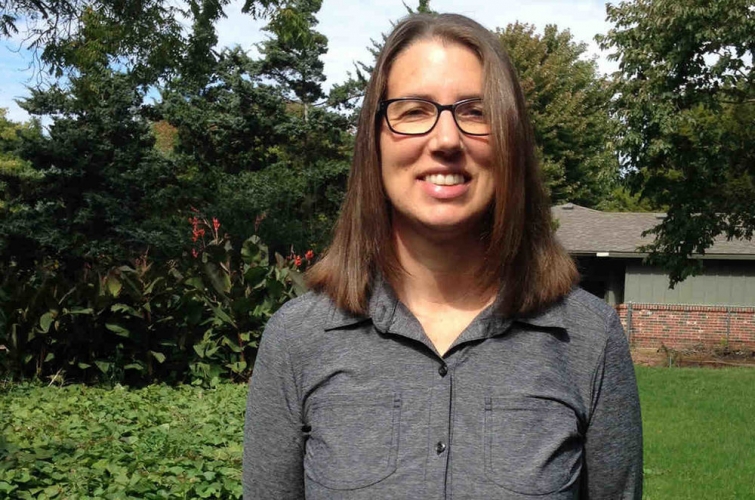From the Open-Publishing Calendar
From the Open-Publishing Newswire
Indybay Feature
Federal Judge Issues Injunction Against Kansas Anti-Boycott Law
On Tuesday, January 30, a federal judge issued a preliminary injunction, blocking Kansas from enforcing the state's anti-boycott law while the case is being litigated. The decision, the first court ruling in a case challenging the constitutionality of laws aimed at countering boycotts for Palestinian rights, affirmed what Palestine Legal has argued since the first anti-boycott laws were introduced in 2014: that such boycotts are clearly protected by the First Amendment. Photo: Esther Koontz, lead plaintiff in an ACLU Lawsuit which challenges a Kansas anti-boycott law. (Credit: aclu.org)
Judge Daniel Crabtree wrote: “[T]he Supreme Court has held that the First Amendment protects the right to participate in a boycott like the one punished by the Kansas law.”
He made this conclusion by comparing the plaintiff’s boycott for Palestinian rights to the 1960s Mississippi boycott of white businesses to protest institutionalized racism. It was this boycott that led to the seminal Supreme Court case, N.A.A.C.P. v. Claiborne Hardware, which held that boycotts to effect social, political and economic change were protected First Amendment activities.
“The conduct prohibited by the Kansas Law is protected for the same reason as the boycotters’ conduct in Claiborne was protected,” Judge Crabtree wrote.
"Ms. Koontz, other members of the Mennonite Church, and others have "banded together" to express, collectively, their dissatisfaction with Israel and to influence governmental action. Namely, its organizers have banded together to express collectively their dissatisfaction with the injustice and violence they perceive, as experienced both by Palestinians and Israeli citizens. She and others participating in this boycott of Israel seek to amplify their voices to influence change, as did the boycotters in Claiborne."
In blocking Kansas from enforcing its anti-boycott law, Judge Crabtree also explained that the state cannot require contractors to adopt a particular viewpoint just because it may be favored by the state:
"The conduct the Kansas Law aims to regulate is inherently expressive. It is easy enough to associate plaintiff’s conduct with the message that the boycotters believe Israel should improve its treatment of Palestinians. And boycotts—like parades—have an expressive quality. Forcing plaintiff to disown her boycott is akin to forcing plaintiff to accommodate Kansas’s message of support for Israel."
Click here for more information: https://www.aclu.org/news/first-judge-blocks-kansas-law-aimed-boycotts-israel
https://palestinelegal.org/news/2018/2/6/federal-judge-issues-injunction-against-kansas-law
He made this conclusion by comparing the plaintiff’s boycott for Palestinian rights to the 1960s Mississippi boycott of white businesses to protest institutionalized racism. It was this boycott that led to the seminal Supreme Court case, N.A.A.C.P. v. Claiborne Hardware, which held that boycotts to effect social, political and economic change were protected First Amendment activities.
“The conduct prohibited by the Kansas Law is protected for the same reason as the boycotters’ conduct in Claiborne was protected,” Judge Crabtree wrote.
"Ms. Koontz, other members of the Mennonite Church, and others have "banded together" to express, collectively, their dissatisfaction with Israel and to influence governmental action. Namely, its organizers have banded together to express collectively their dissatisfaction with the injustice and violence they perceive, as experienced both by Palestinians and Israeli citizens. She and others participating in this boycott of Israel seek to amplify their voices to influence change, as did the boycotters in Claiborne."
In blocking Kansas from enforcing its anti-boycott law, Judge Crabtree also explained that the state cannot require contractors to adopt a particular viewpoint just because it may be favored by the state:
"The conduct the Kansas Law aims to regulate is inherently expressive. It is easy enough to associate plaintiff’s conduct with the message that the boycotters believe Israel should improve its treatment of Palestinians. And boycotts—like parades—have an expressive quality. Forcing plaintiff to disown her boycott is akin to forcing plaintiff to accommodate Kansas’s message of support for Israel."
Click here for more information: https://www.aclu.org/news/first-judge-blocks-kansas-law-aimed-boycotts-israel
https://palestinelegal.org/news/2018/2/6/federal-judge-issues-injunction-against-kansas-law
Add Your Comments
We are 100% volunteer and depend on your participation to sustain our efforts!
Get Involved
If you'd like to help with maintaining or developing the website, contact us.
Publish
Publish your stories and upcoming events on Indybay.
Topics
More
Search Indybay's Archives
Advanced Search
►
▼
IMC Network



